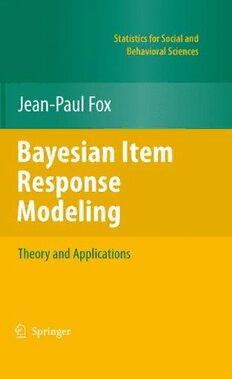
Bayesian Item Response Modeling: Theory and Applications PDF
323 Pages·2010·3.854 MB·English
Most books are stored in the elastic cloud where traffic is expensive. For this reason, we have a limit on daily download.
Preview Bayesian Item Response Modeling: Theory and Applications
Description:
This book presents a thorough treatment and unified coverage of Bayesian item response modeling with applications in a variety of disciplines, including education, medicine, psychology, and sociology. Breakthroughs in computing technology have made the Bayesian approach particularly useful for many response modeling problems. Free from computational constraints, realistic and state-of-the-art latent variable response models are considered for complex assessment and survey data to solve real-world problems. The Bayesian framework described provides a unified approach for modeling and inference, dealing with (nondata) prior information and information across multiple data sources. The book discusses methods for analyzing item response data and the complex relationships commonly associated with human response behavior and features • Self-contained introduction to Bayesian item response modeling and a coverage of extending standard models to handle complex assessment data • A thorough overview of Bayesian estimation and testing methods for item response models, where MCMC methods are emphasized • Numerous examples that cover a wide range of application areas, including education, medicine, psychology, and sociology • Datasets and software (S+, R, and WinBUGS code) of the models and methods presented in the book are available on www.jean-paulfox.com Bayesian Item Response Modeling is an excellent book for research professionals, including applied statisticians, psychometricians, and social scientists who analyze item response data from a Bayesian perspective. It is a guide to the growing area of Bayesian response modeling for researchers and graduate students, and will also serve them as a good reference. Jean-Paul Fox is Associate Professor of Measurement and Data Analysis, University of Twente, The Netherlands. His main research activities are in several areas of Bayesian response modeling. Dr. Fox has published numerous articles in the areas of Bayesian item response analysis, statistical methods for analyzing multivariate categorical response data, and nonlinear mixed effects models.
See more
The list of books you might like
Most books are stored in the elastic cloud where traffic is expensive. For this reason, we have a limit on daily download.
